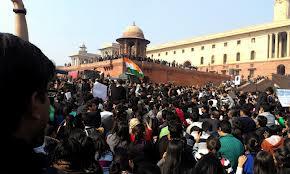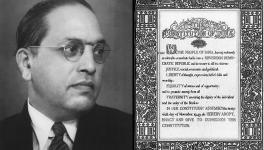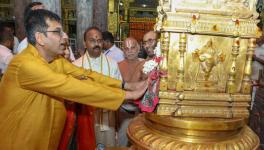Tejpal : Symptom of a Deeper Disease
Journalists are sinking to new lows, with the Tehelka editor Tarun Tejpal case still reverberating through India. The media itself is obsessive about the coverage, almost as if the publicity will atone for the sins. But all said and done Tejpal is the symptom of a malaise that is becoming deep rooted, and afflicts almost all media houses in one way or the other.
Journalism, a great profession, has fallen into disrepute because the media houses have moved away from the serious business of news gathering into the world of power, advertisements, glamour, mega-festivals, as editors and anchors and owners acquire celebrity status. One recalls the days when newspapers like The Statesman and The Patriot refused to give by-lines for even exclusive stories, looking at anonymity as an asset. While this might have been a little harsh for reporters seeking some recognition (after all this is all that one had in an era where wages in Delhi newspapers were as low as Rs 500 a month), the reversal today has really come as a major blow to serious journalism. Everyone wants to be a celebrity, preening and prancing in the limelight, even as hard and fair reporting takes a back seat altogether.
Proprietor-editors set the tone, and all others follow. Mixing business with journalism is a bad idea, as the latter eventually loses out with the money bags dominating. Governments now do not need to impose censorship, their capitalist cronies do it for them, determining who or what should be written about on a daily basis. And given the media houses fascination for the big bucks and high voltage celebrity events, the industrial houses manage the last word and news is eventually tailored to specific requirements.

Image Courtesy: wikipedia.org
The editors today are no longer the Mulgaonkars, Edatata Narayanans, Frank Moraes, Kuldip Nayars of yesterday. And that is certainly not an issue, except for the fact that the standards have fallen as have the priorities. For those named above, and many others of that tribe, news was a drug, facts sacrosanct, and professionalism a bare essential. They refused to compromise on these basics, and as young reporters we were witness to many an argument between the professional editor and the management about the placement of advertisements, indeed even the content of advertisements. These men (unfortunately very few women even then in top positions) stayed till the newspaper went to bed, guiding the process throughout the day and well into the early hours of the morning. There were no glitzy events, no glamour, just serious work tailored by the realization that news could make or break individuals and institutions, and hence a heavy responsibility rested on the editorial teams to check and re-check the facts.
There was a great deal of respect and camaraderie in news rooms those days, with the editors bringing in the professionalism. A couple of incidents apart, women reporters were secure and equal, and in fact reveled in the last. Editors had not turned into predators, as most seem to be today with the heady mix of glamour, power, money, more money, clearly proving to be more potent than their will. And proximity to women that most of them seem unable to manage at all.
The Tejpal incident has left a bad taste, more so as journalists are watch dogs, with the responsibility of protecting the vulnerable. It is a sad day indeed when editors violate this responsibility and prey on the vulnerable to a point of using physical force and rape. It is also particularly regrettable that instead of protecting the girl, and accompanying her to file a police case against the offending editor, others in the establishment sought to silence her and later even intimidate her. It is also very unfortunate that most of the media houses have not set up committees against sexual harassment as required by law, and thereby have left their employees vulnerable to such offences.
It is important for journalists to set the tone, and for the girl reporters to come out against those editors and seniors using their position and power for sexual advances. One has to respect and applaud the young reporter in Mumbai who, despite terrible trauma, has been fighting to ensure that the men who raped her are brought to task; and also the young reporter of Tehelka who is now leaving no stone unturned to ensure that the editor she once respected, pays the price for rape. Many senior journalists have crossed the line with the young people working in television and newspapers today, and this needs to be dealt with through the law. Instead of leaving their jobs, the young reporters should summon the courage to file and pursue cases against these powerful men and thereby ensure that justice is done. This will be their contribution to a world where women remain at the receiving end, and find it difficult to even seek justice because of the social stigma that somehow attaches itself to them.
Disclaimer: The views expressed here are the author's personal views, and do not necessarily represent the views of Newsclick
Get the latest reports & analysis with people's perspective on Protests, movements & deep analytical videos, discussions of the current affairs in your Telegram app. Subscribe to NewsClick's Telegram channel & get Real-Time updates on stories, as they get published on our website.
























